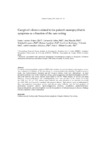Caregiver's distress related to the patient's neuropsychiatric symptoms as a function of the care-setting

Ver/
Use este enlace para citar
http://hdl.handle.net/2183/18476
A non ser que se indique outra cousa, a licenza do ítem descríbese como Atribución-NoComercial-SinDerivadas 3.0 España
Coleccións
- GI-GIGG - Artigos [113]
- INIBIC-IX - Artigos [31]
Metadatos
Mostrar o rexistro completo do ítemTítulo
Caregiver's distress related to the patient's neuropsychiatric symptoms as a function of the care-settingAutor(es)
Data
2016-09-09Cita bibliográfica
Lorenzo-López L, Labra C, Maseda A, et al. Caregiver's distress related to the patient's neuropsychiatric symptoms as a function of the care-setting. Geriatr Nurs. 2017;38(2):110-118
Resumo
[Abstract] Prevalence of neuropsychiatric symptoms (NPS) and correlation between its intensity and caregiver distress were evaluated as a function of the care-setting in a cross-sectional study including 72 patient-caregiver dyads. The Neuropsychiatric Inventory and the Caregiver Distress Scale were administered. The most prevalent symptoms were: in the formal care-setting, agitation/aggression and depression/dysphoria (42.4%), and in the informal care-setting, aberrant motor behavior (59.0%). While changes in appetite and eating behaviors, depression/dysphoria and irritability/lability were more prevalent in the formal care-setting (p < .0001, p = .011, p = .021), aberrant motor behavior was more prevalent in the informal care-setting (p = .007). NPS were positively correlated with caregiver distress. High patients' scores in hallucinations, sleep and night-time disturbances, anxiety, and aberrant motor behavior were the best predictors of professional caregiver's distress. Agitation/aggression, delusions, disinhibition, apathy/indifference, depression/dysphoria, and elation/euphoria were the best predictors of informal caregiver's distress. Findings may have important clinical implications.
Palabras chave
Institutionalized elderly people
Neuropsychiatric symptoms
Caregiver distress
Care-setting
Neuropsychiatric symptoms
Caregiver distress
Care-setting
Versión do editor
Dereitos
Atribución-NoComercial-SinDerivadas 3.0 España
ISSN
0197-4572
1528-3984
1528-3984






